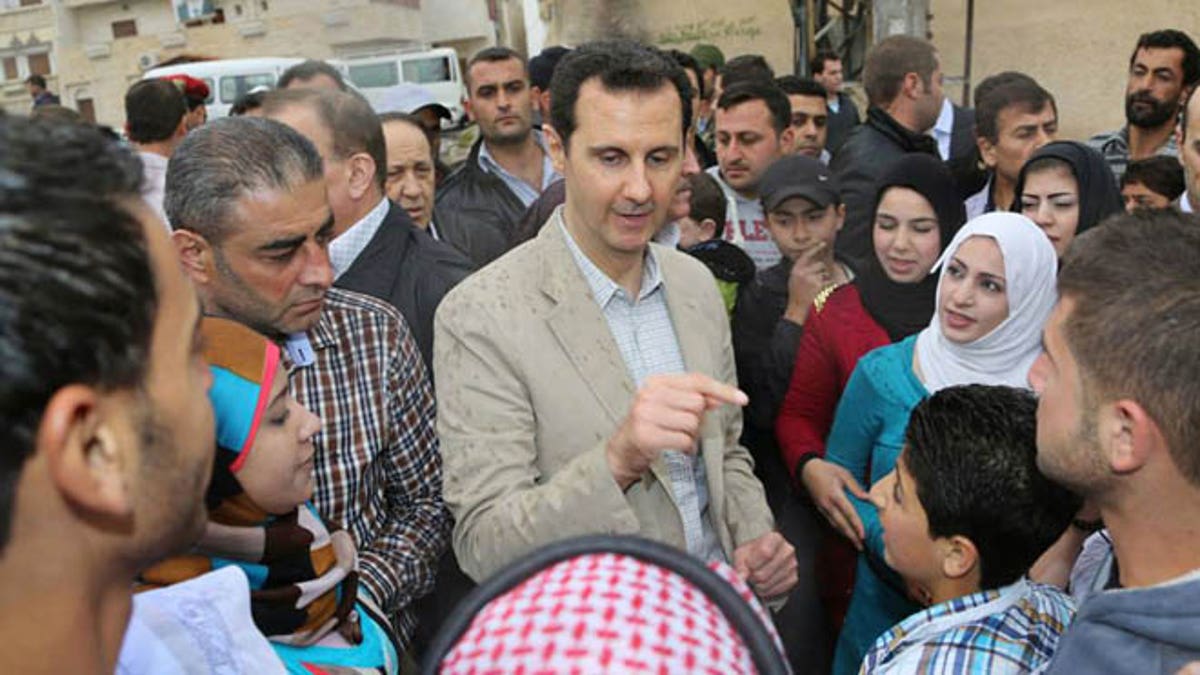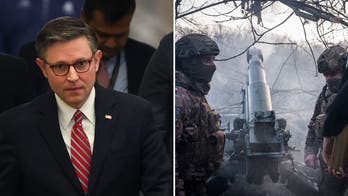
In this photo taken April 20, 2014 and released by the Syrian official news agency SANA, Syrian President Bashar Assad, center, speaks with Syrian citizens during his visit to Ain al-Tineh village, near Damascus, Syria. (AP)
The Obama administration said Monday it has "indications" chemical weapons were used in Syria earlier this month, and is investigating whether the Assad regime might have been responsible.
State Department spokeswoman Jen Psaki discussed the allegations a day after French President Francois Hollande said France also had indications the regime is still using chemical weapons.
Bashar Assad's government last year agreed to ship chemical weapons out of his country following a sarin gas attack, as part of a deal to de-escalate tensions with the United States and its allies. President Obama had declared the use of chemical weapons a "red line," but backed off threats of military force following the agreement.
The latest attack in question allegedly occurred April 11 in the rebel-held village of Kfar Zeita.
"We have indications of the use of a toxic industrial chemical -- probably chlorine -- in Syria this month in the opposition-dominated village of Kfar Zeita," Psaki said. "We're examining allegations that the government was responsible. We take all allegations of the use of chemicals in combat use very seriously."
White House Press Secretary Jay Carney repeated that statement shortly afterward at the White House daily briefing. He said the matter is "being investigated."
He said that once more information is gathered, including who is responsible, the administration can discuss "what reaction, if any" there would be from the international community. He noted that under last year's deal, 65 percent of Syria's chemical weapons stockpiles have been removed for destruction, and "that process continues."
Carney said the new allegations are "of concern," while Sen. John McCain, R-Ariz., described them as "disturbing."
“Whether by chemical weapons attacks or other barbaric means including barrel bombing and starvation campaigns, the Assad regime continues to carry out war crimes in its slaughter of innocent men, women, and children," McCain said in a statement. "Its breach of the chemical weapons agreement should surprise no one, and unless the Obama Administration is willing to force a price for such behavior, we should only expect more atrocities to come.”
Both sides in Syria's civil war blamed each other for the attack in Kfar Zeita.
Online videos posted by rebel activists from Kfar Zeita echoed earlier images that sparked a world outcry last year, showing pale-faced men, women and children gasping for breath at a field hospital.
The main Western-backed opposition group, the Syrian National Coalition, said the poison gas attack hurt dozens of people, though it did not identify the gas used.
The Britain-based Syrian Observatory for Human Rights, an activist group that relies on a network of on-the-ground volunteers, said the gas attack happened during air raids that left heavy smoke over the area. It reported that people suffered from suffocation and breathing problems after the attack.
State-run Syrian television blamed members of the Al Qaeda-linked Nusra Front rebel group for the attack, saying they used chlorine gas to kill two people and injure more than 100. It did not say how it confirmed chlorine was used.
Chlorine, one of the most commonly manufactured chemicals in the U.S., is used to purify drinking water. But as a gas, it can be deadly, with the German army using it in warfare in World War I. The Geneva Protocol of 1925, which Syria signed, banned its use in battle.
Carney and Psaki also slammed the Assad regime on Monday for an election scheduled for June, calling the plans a "parody of democracy."
The Associated Press contributed to this report.




